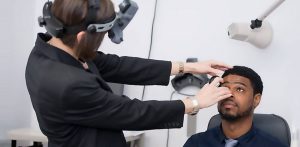Want to learn more about neuro-optometric rehabilitation?
It is not uncommon for visual symptoms to surface following a traumatic brain injury (TBI) or neurological condition. These vision changes can be debilitating and make it difficult to drive, watch TV, read, and sometimes even walk.
Neuro-optometric rehabilitation is an effective way to strengthen the visual system and reduce visual symptoms post-TBI or any other neurological condition.
Neuro-optometric rehabilitation focuses on strengthening the visual skills necessary for independent living, and is effective in improving the following conditions:
- Diplopia (double vision)
- Binocular vision dysfunction
- Convergence or accommodation difficulties
- Acquired strabismus
- Nystagmus
- Visual perception deficits
- Traumatic visual acuity loss
SEE RELATED: Eye Movement Problems After a Brain Injury
If you have any signs above, schedule an eye exam with a neuro-optometrist near you to discuss the best options.
What the research shows
Neuro-optometric rehabilitation is supported by the American Optometric Association, the College of Optometrists in Vision Development and the Neuro-Optometric Rehabilitation Association.
The efficacy of this type of therapy is widely known and recognized by other medical professionals as well.
- The NeuroRehabilitation journal published a study in 2014 that reported reduced visual symptoms and increased reading rate following 6 weeks of neuro-optometric rehabilitation for patients who had sustained a mild TBI.
- According to the Journal of the American Academy of Optometry (2017) 218 post-concussion patients were given visual rehabilitation for binocular conditions such as convergence insufficiency, accommodative insufficiency, eye movement difficulties and oculomotor issues. Of the 218, a vast majority of the participants showed improvements in their conditions.
- The Journal of Optometry (2018) published a study that reported a 100% success rate for participants who underwent neuro-optometric rehabilitation. Each of the participants showed improved eye movements after approximately 10 hours of neuro-optometric rehabilitation therapy.
- The Journal of Disability and Rehabilitation (2019) found neuro-optometric rehabilitation to be effective following reports of 3,000 post-mild TBI patients who underwent this type of therapy. The journal also stated that every person who sustains a brain injury should have their vision evaluated by a neuro-optometrist or other eye care professional.
- An article in the Acquired Brain Injury (2019) explained the importance of neuro-optometric rehabilitation for patients post-TBI, as well as for patients who experience visual symptoms from a viral infection, autoimmune disease, or vestibular dysfunction.
If you have been diagnosed with a neurological condition or sustained a brain injury it is important to have your vision checked by a neuro-optometrist.
Vision problems can cause a range of debilitating symptoms that can be reduced with neuro-optometric rehabilitation therapy.
Healthy vision is essential for your independence and quality of life.
LEARN MORE: Neuro-Optometry
If you have had a TBI, schedule a functional eye exam with a neuro-optometrist near you to ensure healthy and clear vision.
Following a TBI or neurological condition, visual symptoms may arise.
These vision changes can impact your life and make it difficult to drive, watch TV, read, and enjoy hobbies. Your symptoms can be successfully managed by a neuro-optometrist.
https://pubmed.ncbi.nlm.nih.gov/29631511/
https://pubmed.ncbi.nlm.nih.gov/24284470/










